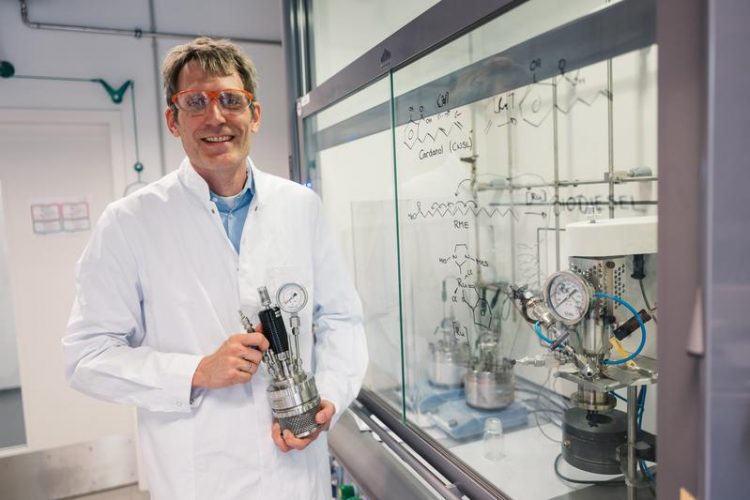Innovative Technique: Researchers Produce Biofuel for Conventional Diesel Engines

Professor Lukas J Gooßen Credit: RUB, Kramer
In Europe, biodiesel is largely produced from rapeseed oil. Chemically, it comprises long-chain hydrocarbon compounds, known as fatty acid methyl esters. It has different properties to diesel obtained from mineral oil. For instance, the boiling point is much higher.
This means biodiesel tends to vaporise only partially, and to form deposits on engine components. This makes pure biodiesel unsuitable as a fuel for standard engines. Injection pumps, seals, and pipes would need to be constructed differently. “Cars fuelled with pure biodiesel require specially designed engines,” explains Dr Lukas Gooßen.
In collaboration with chemists Kai Pfister and Sabrina Baader from the collaborative research centre ‘3MET’ at the University of Kaiserslautern, Gooßen has developed an innovative technique for treating biodiesel. “With virtually no energy input, we convert a mixture of plant-derived fatty esters and bio-ethylene, another chemical compound, into fuel,” the professor says. “This can be combusted undiluted in modern diesel engines.”
The particular advantage of this new technique is that the researchers are able to precisely adjust the chemical properties of the mixture. “We combine two catalytic methods to transform the long-chain fatty esters into a mixture of compounds with shorter chains,” he elaborates. This process changes the ignition and combustion properties of the biodiesel. Combustion starts at lower temperatures.
“We are thus able to adjust our biodiesel to the applicable standards for petroleum diesel,” Gooßen adds. Moreover, the process is environmentally friendly: it neither requires solvents, nor produces waste.
The two methods were synchronised with each other using mathematical simulations by Mathias Baader from the University of Kaiserslautern. Silvia Berndt at the University of Rostock proved that the mixture complies with the strict standard (EN 590) for modern diesel engines. In preliminary test runs, Kai Pfister has managed to demonstrate that this new diesel fuel can actually power a model car.
The research was carried out within the collaborative research centre ‘3MET’ (SFB/TRR 88 ‘Cooperative Effects in Homo and Heterometallic Complexes’) at the University of Kaiserslautern and the cluster of excellence ‘RESOLV’ (Ruhr Explores Solvation’) at Ruhr-Universität Bochum. It was also supported by the German Federal Environmental Foundation (DBU) and the Carl Zeiss Foundation.
Gooßen holds the Evonik Chair of Organic Chemistry at Ruhr-Universität Bochum. Until last year, he was professor at the University of Kaiserslautern, where the new technology was developed. His graduate students Kai Pfister and Sabrina Baader have successfully completed their doctoral work and are now pursuing careers in industry.
The study was published in the prestigious journal Science Advances: ‘Biofuel by isomerizing metathesis of rapeseed oil esters with (bio)ethylene for use in contemporary diesel engines’.
DOI: 10.1126/sciadv.1602624
For enquiries:
Prof Dr Lukas J Gooßen
Ruhr-Universität Bochum
Tel.: +49 (0)234 32 19075
Email: lukas.goossen(at)rub.de
Dr Marc Prosenc
‘3MET’ Office
University of Kaiserslautern
Tel.: +49 (0)631 205 5185
Email: prosenc(at)chemie.uni-kl.de
Media Contact
More Information:
http://www.uni-kl.deAll latest news from the category: Life Sciences and Chemistry
Articles and reports from the Life Sciences and chemistry area deal with applied and basic research into modern biology, chemistry and human medicine.
Valuable information can be found on a range of life sciences fields including bacteriology, biochemistry, bionics, bioinformatics, biophysics, biotechnology, genetics, geobotany, human biology, marine biology, microbiology, molecular biology, cellular biology, zoology, bioinorganic chemistry, microchemistry and environmental chemistry.
Newest articles

NASA: Mystery of life’s handedness deepens
The mystery of why life uses molecules with specific orientations has deepened with a NASA-funded discovery that RNA — a key molecule thought to have potentially held the instructions for…

What are the effects of historic lithium mining on water quality?
Study reveals low levels of common contaminants but high levels of other elements in waters associated with an abandoned lithium mine. Lithium ore and mining waste from a historic lithium…

Quantum-inspired design boosts efficiency of heat-to-electricity conversion
Rice engineers take unconventional route to improving thermophotovoltaic systems. Researchers at Rice University have found a new way to improve a key element of thermophotovoltaic (TPV) systems, which convert heat…



